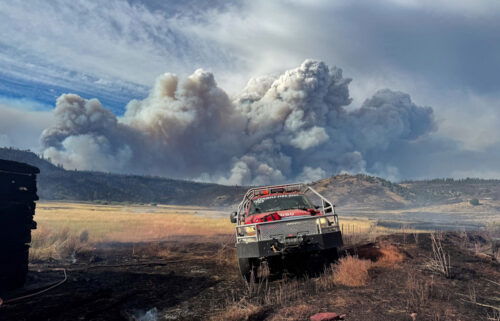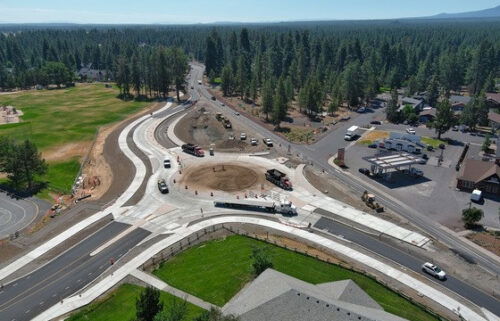Wyden bill would spend billions on 21st Century Conservation Corps
WASHINGTON (KTVZ) -- Sen. Ron Wyden, D-Ore., a senior member of the Senate Committee on Energy and Natural Resources, and Rep. Joe Neguse, Chair of the U.S. House Subcommittee on National Parks, Forests and Public Lands, unveiled legislation Friday to establish a 21st Century Conservation Corps.
The 21st Century Conservation Corps Act, originally introduced in July 2020, would provide critical funds to support a natural resource management and conservation workforce and bolster wildfire prevention and preparedness to protect the health and safety of communities during the unparalleled combination of threats posed by wildfire season and the COVID-19 pandemic, as well as supporting President Biden's climate and economic agendas.
“Rural communities are facing two big challenges: struggling economies and continued wildfire threats. By investing in a 21st century workforce, this bill will put people to work to tackle the climate emergency, restore our public lands and reduce wildfire risks,” Wyden said. “The bottom line, creating new jobs and supporting our public lands go hand in hand.
“Just like much of the west, Colorado experienced devastating and relentless wildfires this year. It’s incredibly clear that investments in fire mitigation and response, and investments in our public lands and forests are long overdue,” Congressman Joe Neguse said. “Our 21st Century Conservation Corps legislation would create a much-needed stimulus for America’s public lands and rural economies by taking a page out of President Franklin D. Roosevelt’s successful playbook and revitalizing this popular program born out of the New Deal. Our bill would put Americans back to work in natural resource management to restore America’s forests and would make needed investments to prevent catastrophic wildfire. The proposal was written with Colorado in mind, with the west in mind, with the firefighters and emergency management officials and with our public lands and our climate in mind, and it’s time we get it done.”
“Oregon’s public lands have made countless contributions to the spirit of our state, and like public lands across America, they’re integral to the vitality of countless rural economies,” said Merkley. “Now more than ever, we should harness the opportunity to create good jobs that will also help preserve and sustain these lands for future generations to enjoy them. This is a commonsense way to invest in our workers, maintain our natural treasures, and help our rural communities get through this storm and thrive on the other side.”
“As a former natural resources AmeriCorps Member who worked primarily in rural New Mexico, I know firsthand the value of conservation work in rural communities,” Heinrich said. “National service members make a major difference by conserving our public lands, building resilient landscapes, and helping grow the outdoor economy, which was fueling some of the fastest job growth in rural communities before the onset of the pandemic. When he established the original Civilian Conservation Corps during the Great Depression, President Franklin Roosevelt understood that a generation of out-of-work Americans were not without worth, but rather that they could leave an indelible mark on our country. We need to expand national service opportunities in this moment to provide a new generation of Americans with the opportunity to get back to work, leave their mark, and play a major role in our national recovery.”
“As someone who grew up on the Olympic Peninsula, I’m committed to doing everything we can to grow jobs and opportunity in rural communities. Making investments to support our public lands and to grow jobs in outdoor recreation is a win-win for regions like ours,” Representative Derek Kilmer, D-Wash., co-lead of the legislation, said. “The 21st Century Conservation Corps Act will grow opportunities in our region by providing targeted relief for outfitters and guides to stay afloat during these challenging times, bolstering wildfire prevention and preparedness, and by creating new jobs focused on enhancing access to our public lands. I’m proud to support it.”
“Congress is moving aggressively to protect the economy and save lives, but it’s imperative that our recovery efforts also support long term resiliency,” Congressman Jared Huffman, Chair of the House Natural Resources Subcommittee on Water, Oceans and Wildlife and co-lead of the legislation, said. “In rural communities, focusing on public health and safety means also preparing communities for wildfire, keeping our forests healthy, and investing in the public lands that support rural economies. Our bill would scale up investments in our forests, support the outdoor recreation economy, and bring restoration jobs to rural communities like those in northwest California.”
The impacts of COVID-19 on public health and the economy, combined with high levels of drought throughout the West, created unprecedented wildland firefighting challenges in 2020. Those at increased risk for adverse health effects due to wildfire smoke exposure – people who suffer from heart or respiratory diseases – are also particularly vulnerable to COVID-19. The COVID-19 crisis has also quickly brought the outdoor economy to a halt – and with it lost jobs – as Americans are limiting travel.
The 21st Century Conservation Corps Act aims to address these challenges directly by investing in workforce training and jobs to support conservation programs and reforestation to restore our public lands; address deferred maintenance and expand recreation access on our public lands; provide direct relief for outfitters and guides; improve access to clean drinking water; and mitigate the risk of catastrophic wildfires.
This legislation:
- Establishes a $9 billion fund for qualified land and conservation corps to increase job training and hiring specifically for jobs in the woods, helping to restore public lands and provide jobs in a time of need;
- Establishes a $2 billion fund to provide economic relief for outfitters and guides holding U.S. Forest Service and U.S. Department of the Interior special use permits;
- Provides an additional $500 million for Tribal drinking water infrastructure repairs, prioritizing Tribal communities that have decrepit and underfunded drinking water systems causing health and safety emergencies;
- Provides $2 billion for the National Fire Capacity program, which helps the Forest Service implement FireWise, to prevent, mitigate, and respond to wildfire around homes and businesses on private land;
- Provides $2 billion for the FEMA Building Resilient Infrastructure and Communities (BRIC) program to improve resiliency for communities impacted by wildfire;
- Provides $6 billion for U.S. Forest Service, $6 billion for the National Park Service, and $2 billion for the Bureau of Land Management maintenance accounts to create jobs, reduce the maintenance backlog, and expand access to recreation;
- Provides an additional $3.5 billion for the U.S. Forest Service and $2 billion for the U.S. Bureau of Land Management to support science-based projects aimed at improving forest health and reducing the risk of catastrophic wildfire;
- Provides $3.5 billion for reforestation projects on a combination of federal, state, local, tribal and NGO lands, with over one hundred million trees to be planted in urban areas across America by 2030;
- Increases access to public lands through expanding and investing in programs like Every Kid Outdoors and the Outdoor Recreation Legacy Partnership;
- Supports voluntary climate stewardship practices on over 100 million acres of farmland by providing supplemental funding for USDA working lands conservation programs; and
- Helps restore and improve rangeland health by providing an additional $150 million for the North American Waterfowl Management and Joint Ventures program and $150 million for the U.S. Fish and Wildlife Partners for Fish and Wildlife.
Original cosponsors of the legislation include Senators Jeff Merkley, D-Ore., Martin Heinrich, D-N.M., and Representatives Derek Kilmer, D-Wash., Jared Huffman, D-Calif., and Alan Lowenthal, D-Calif.
Additional quotes of support for the bill are available here.
A one-page summary of the bill is available here.
A section-by-section summary of the bill is available here.



